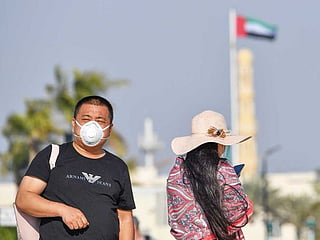Global markets plunge as virus cases spread beyond Asia
Wall Street opens 800 points down, bond yield inversion shows classic recession signal
New York: The Dow Jones Industrials shed 800 points on Monday as investors scurried to safer assets after a sharp rise in coronavirus cases outside China fuelled fears of a bigger impact to global growth.
Gold rose to a seven-year high and the inversion between the 3-month and 10-year US Treasury yields deepened as a rise in cases in Iran, Italy and South Korea over the weekend fanned fears of a pandemic. An inversion of the curve is a classic recession signal.
All of the Dow’s 30 blue-chip members, as well as the 11 major S&P sectors were in the red. Technology stocks dropped 3.1% and were the biggest drag on the benchmark index.
Defensive utilities and real estate posted the smallest declines.
Apple Inc slid 3.5% as data showed sales of smartphones in China tumbled by more than a third in January.
Last week, Wall Street’s main indexes notched record highs, partly on optimism that the global economy would be able to snap back after an initial hit, supported by central banks.
“Some people are re-assessing the extent to which China is being damaged by the spread of the virus and, more broadly, whether other parts of world will get contagion effects of that,” said Nitesh Shah, director of research at WisdomTree.
Chipmakers, which heavily rely on China for revenue, were among the worst performers, with the Philadelphia SE Semiconductor index down 4.2%.
Interest rate-sensitive banks shed 2.7%, while the CBOE Volatility Index, a barometer of expected near-term market volatility, jumped to a six-month high.
At 9:55am ET, the Dow Jones Industrial Average was down 764.01 points, or 2.64%, at 28,228.40, the S&P 500 was down 83.88 points, or 2.51%, at 3,253.87. The Nasdaq Composite was down 280.96 points, or 2.93%, at 9,295.63.
In a rare bright spot, Gilead Sciences Inc, whose antiviral remdesivir has shown promise in monkeys infected by a related coronavirus, rose 5.8%.
European shares in big slump
European shares suffered their biggest slump since mid-2016 on Monday and oil plunged almost 5%.
Europe had seen Milan’s stock market plummet over 5.5% after a spike in cases of the virus left six dead in Italy and parts of the country’s industrial north in virtual lockdown.
Frankfurt and Paris both fell more than 4% and London’s FTSE dropped 3.8%, wiping at least $400 billion off the region’s market value in a few short hours.
The flight to safety was just as resounding, gold surging 2.5% to a seven-year high of $1,680 an ounce.
“Everybody sees that this could be another leg down for the economy, and we were already in quite a fragile state to begin with,” said Rabobank’s head of macro strategy, Elwin de Groot.
“It could be another step towards a recession in more countries.”
Asia in downward spiral
In Asia overnight, South Korea’s KOSPI had slumped 3.9% after the government declared a high alert. The number of cases rose to 763 and deaths to seven.
Japanese markets were closed, but Australia’s benchmark index slid 2.25% and New Zealand fell about 1.8%. China’s blue-chip CSI300 closed down 0.4%, taking MSCI’s broadest index of Asia-Pacific shares outside Japan to its lowest since early February.
The virus has now killed 2,592 people in China, which has reported 77,150 cases, and spread to some 28 other countries and territories, with a death toll outside of China around two dozen, according to a Reuters tally.
Forex markets
FX markets reacted by pushing up the safe-haven Japanese yen to 111.34 yen per dollar. But against the rest of the world, the dollar was again showing its strength.
The euro was squeezed towards $1.08 and the Australian dollar, often traded as a proxy for China risk, fell to an 11-year low of $0.6585.
Korea’s won was down 1% at 1,219.06 after falling to its weakest since August 2019. Emerging-market currencies from Mexico’s peso and Turkey’s lira to Poland’s zloty and Russia’s rouble were all in the red.
In commodity markets, Brent crude fell 3.5%, or $2.1, to $56.35 a barrel. US crude dropped 3%, or $1.64, to $51.74 a barrel. Among the main industrial metals, copper fell 1.4% and zinc was down 2.5%.
“Oil prices will remain vulnerable here as energy traders were not pricing in the coronavirus becoming a pandemic,” said Edward Moya, senior market analyst at OANDA.
“While some parts of China are seeing improving statistics ... markets will remain on edge until we start seeing the situation improve in Iran, Italy, South Korea and Japan.”
Reuters & AP








